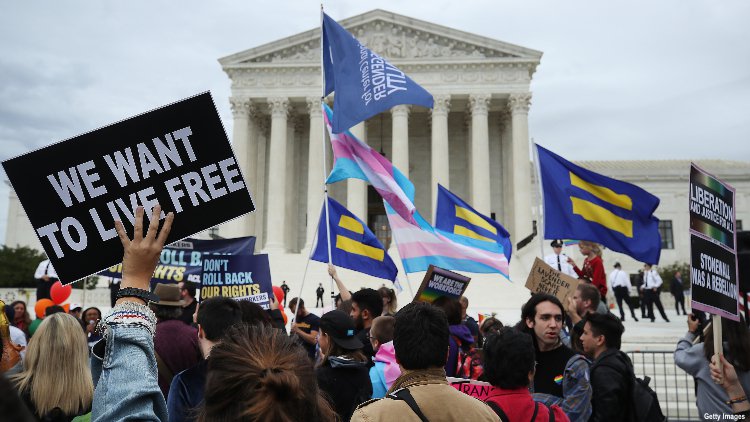The Supreme Court Doesn’t Get to Rule on Our Humanity

Posted by Siqi Cheng
October 17, 2019

On Tuesday, October 8th, Supreme Court Justices heard arguments on whether existing federal law should protect LGBTQ people from employment discrimination. For the 1 million American workers who identify as transgender and another 7.1 million identify as gay, lesbian, or bisexual, the Court’s decisions will have a significant impact on their lives and livelihood.
Currently, only 48 % of the LGBTQ population lives in states prohibiting employment discrimination based on sexual orientation and gender identity; the other 52% can be fired from their jobs and evicted from their apartments for being who they are. If the Supreme Court decides that Title VII doesn’t apply to LGBTQ workers, millions will be left without legal protections.
Ohio is one of the states where there are no explicit prohibitions for discrimination based on sexual orientation or gender identity. No non-discrimination or anti-bully laws are covering LGBTQ students, no hate crime law is covering LGBTQ people, and no conversion therapy ban is covering LGBTQ youth. The “gay and trans panic” defense strategies are still permitted in the state. For approximately 500,000 LGBTQ adults and youths living in Ohio, state laws offer little to no protection.
As a queer woman living in Ohio, thinking about these issues in October feels particularly disheartening. October is LGBT History Month in the United States. It was the month of the first March on Washington for Lesbian and Gay Rights in 1979. This is a time when I’m supposed to recognize crucial moments in LGBTQ history, honor the LGBTQ activists who fought for queer liberation and reflect on LGBTQ individuals’ impact in building the world we live in now. This is supposed to be a time for remembrance and celebration. This month is supposed to remind the LGBTQ and the broader communities that we, the LGBTQ folks have always been here and that all of us need to take actions to ensure that LGBTQ folks’ humanity is affirmed and our rights are protected.
Because it has never been just about us, the LGBTQ Rights Movement has long been inextricably intertwined with other movements for social justice and equality in the United States, such as the African American Civil Rights Movement, the Women’s Liberation Movement, and the Labor Movement. LGBTQ rights have become integral to the vision of a just, equitable world.
The loss of safeguards to protect LGBTQ rights will always have broader implications. For the three cases in which the Supreme Court heard the arguments, not only are LGBTQ people’s jobs, housing, and access to health care and education on the line, the Court’s ruling can potentially strip the sex discrimination law under Title VII of its power. If the Court decides that LGBTQ workers should not be protected under Title VII, it means that the Court rules that discrimination based on sex stereotypes is legal. This will allow employers to fire any employee who doesn’t conform to their view of femininity or masculinity. It will take protection away from all workers while affecting women disproportionately as they’re held to more strict gender norms. But no individual or group is immune- narrowing the scope of federal civil rights protections hurts everyone.
We can not rely upon this structurally engineered conservative Supreme Court to deliver us the results we need. We need to take care of ourselves and each other, so we’re prepared for a lengthy fight for our right to fully participate in the public sphere without discrimination or oppression. Audre Lorde said, “Caring for myself is not self-indulgence, it is self-preservation, and that is an act of political warfare.” For all my LGBTQ folks, your sexual orientations and gender identities are valid, so are your anger and frustration. Channel it into the work of caring for yourself and your community. Queer kinship- our bonds with others in the queer community will sustain and nourish us and will remind us why we have to win.
LGBTQ folks have always been here, and we are not going anywhere. October 8th was the first time the Supreme Court heard arguments regarding the civil rights of a trans person. Whatever the decisions might be, we’ve made history in this LGBT History Month. Let us be clear: “The Supreme Court doesn’t get to rule on our humanity. They’re ruling on their own.”
Leave a Reply
You must be logged in to post a comment.

